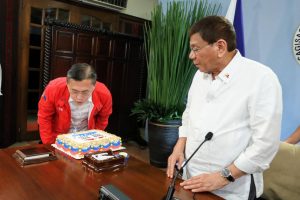Judges at the International Criminal Court (ICC) yesterday authorized an investigation into the Philippines’ deadly “war on drugs” campaign, describing it as a “widespread and systematic attack against the civilian population.”
In June, the court’s former prosecutor Fatou Bensouda requested an authorization to open an investigation into President Rodrigo Duterte’s blood-stained campaign. In a statement, she said that a preliminary probe had found “a reasonable basis to believe that the crime against humanity of murder has been committed on the territory of the Philippines” between July 1, 2016, when Duterte came to office, and March 16, 2019, when he pulled the country out of the Rome Statute that created the ICC.
In a written decision, judges from the ICC’s Pre-Trial Chamber I said that they had considered evidence presented on behalf of at least 204 victims and found a “reasonable basis to proceed with an investigation” into the drug war killings.
According to a statement from the ICC, the judges ruled that “based on the facts as they emerge at the present stage and subject to proper investigation and further analysis, the so-called ‘war on drugs’ campaign cannot be seen as a legitimate law enforcement operation, and the killings neither as legitimate nor as mere excesses in an otherwise legitimate operation.” It said that the killings appeared to amount to a “widespread and systematic attack against the civilian population.”
The judges also included in the scope of the investigation, killings in the area of Davao on the southern island of Mindanao dating back to November 1, 2011, the date that the Philippines acceded to the Rome Statute, to June 30, 2016.
Prior to becoming president in 2016, Duterte served for more than two decades as mayor of Davao City, during which time he road-tested the uncompromising anti-drug measures that he would later employ on a national scale.
In December of last year, Bensouda stated that was “satisfied” that various crimes of humanity – from murder and torture to the infliction of serious physical injury and mental harm – had been committed during Duterte’s “war on drugs.” Her office claimed that many of the people killed in Duterte’s crackdown had been on a drug watch list compiled by authorities or had previously surrendered to police, while a significant number of minors were victims.
The full death toll of the ongoing campaign is unclear. The government’s own data puts the total at 6,117 people since the beginning of the campaign, but independent estimates of the toll claim the total amounts to anywhere from 12,000 to more than 20,000.
The ICC is unlikely to get any cooperation from the Philippine government as long as Duterte is president. Today, his Chief Presidential Legal Counsel Salvador Panelo said that ICC investigators would be barred from entering the Philippines. Presidential spokesperson Harry Roque has previously declared that Duterte “will never cooperate” with a probe, chalking up the claims of extrajudicial killings to “communists and politicians who are enemies of the president.”
But the ICC investigation is set to add an interesting subplot to the presidential election due in May 2022. Should Duterte’s opponents win power, they could potentially cooperate with an ICC investigation, especially if domestic prosecutions prove too politically complicated.
This may at least partially explain Duterte’s desire to run as the vice presidential candidate of his PDP-Laban party at next year’s election, given that the Philippine Constitution bars him from seeking a second consecutive term as president. Karlo Nograles, the party’s executive vice president, said last month that Duterte was making a “sacrifice” and heeding “the clamor of the people,” according to The Guardian. Duterte later said he was running in order to “continue the crusade.”
But observers of Philippine politics have interpreted this as an attempt to circumvent the single-term limit and serve a second term via the backdoor. This interpretation is certainly strengthened by the fact that Duterte’s longtime aide, Senator Christopher “Bong” Go, is in the box seat to be appointed the party’s presidential candidate. Some have even suggested that if both men win office, Bong Go could potentially resign and allow Duterte to assume the presidency for the remainder of his term.
Critics say the decision is also motivated by Duterte’s desire to shield himself from possible legal action when he leaves office, including by the ICC. “His craving for immunity only shows he is afraid of the International Criminal Court after all his bluster of being a fearless president,” former congressman Neri Colmenares, a human rights lawyer who helped bring charges against Duterte before the ICC, told the New York Times recently.
Perhaps the greatest obstacle to justice for the drug war’s thousands of victims is the fact that Duterte remains resoundingly popular with the Philippine electorate. This means that even if he loses the election, any attempt to prosecute him in the domestic courts will face considerable, and perhaps insurmountable, political opposition, including from the powerful Philippine National Police. Meanwhile, one could expect that any effort to prosecute him by the ICC would elicit a vociferous nationalist counter-reaction.
A lot has to happen for the 76-year-old leader to find himself in the dock in The Hague. Nonetheless, the announcement of the ICC’s investigation will no doubt send a frisson of worry through the quarters of those most closely connected with the murderous anti-drugs campaign.
































